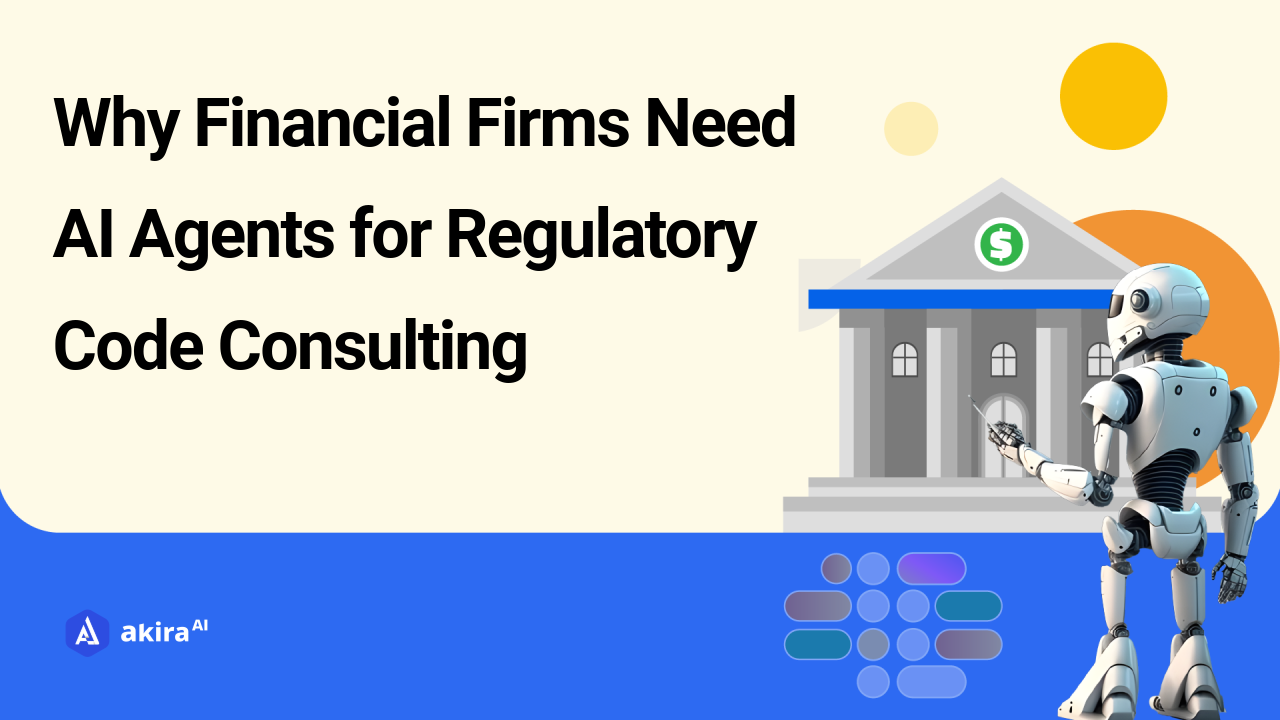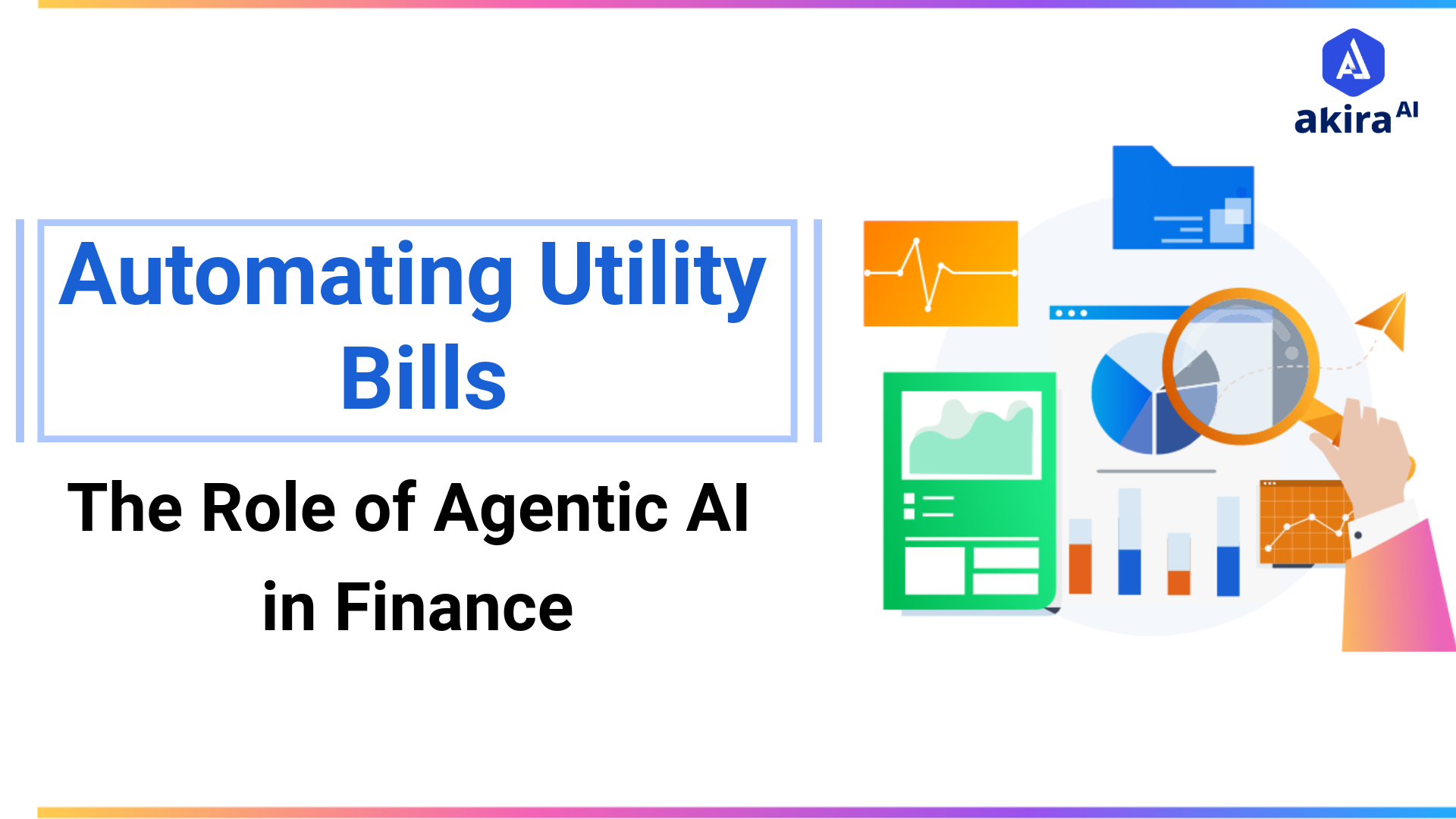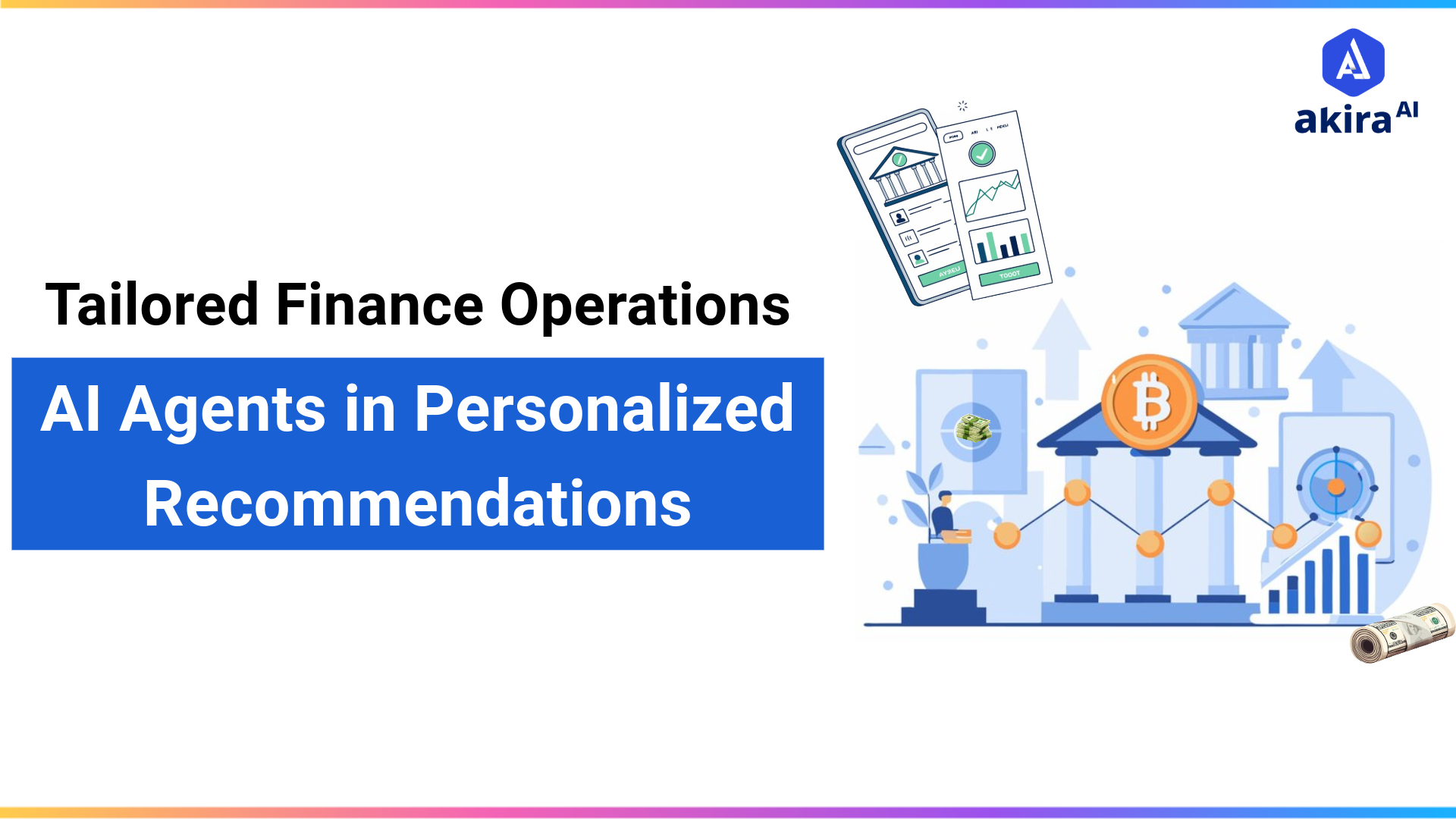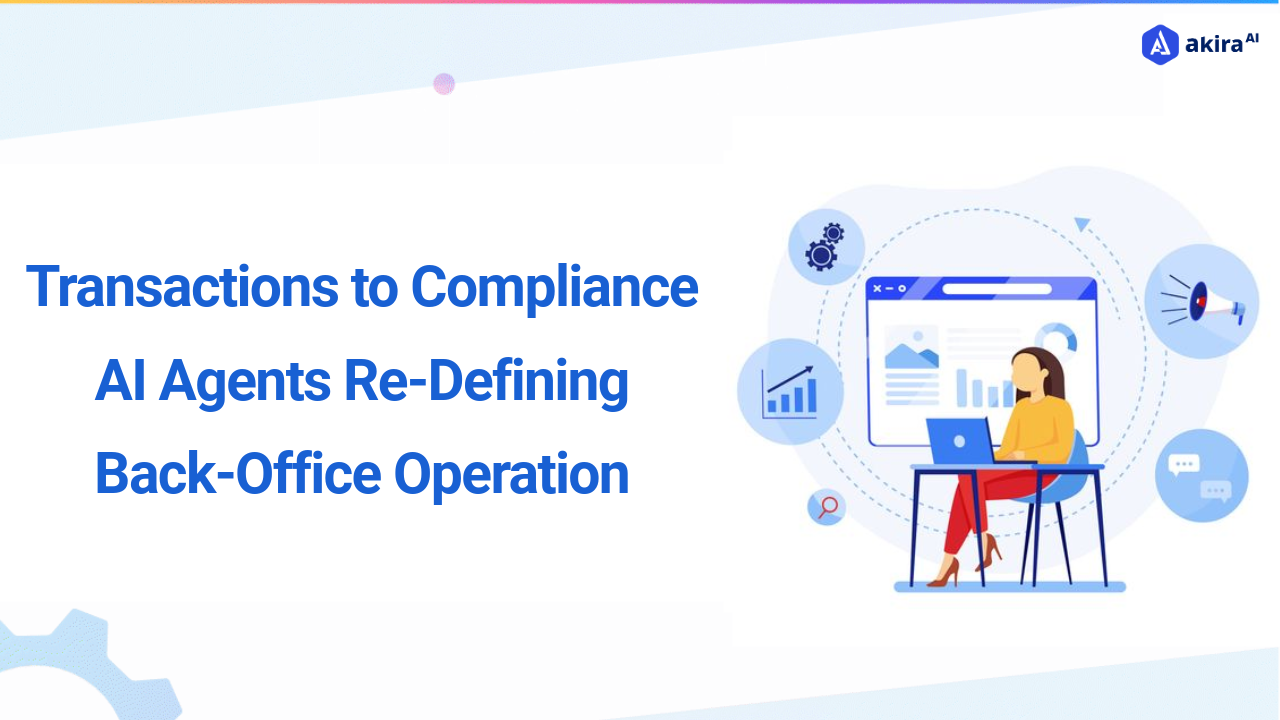Key Insights
Regulatory code change consulting helps financial institutions stay compliant with evolving regulations. AI agents are transforming this process by automating workflows, providing real-time updates, and predicting regulatory changes. These innovations improve speed, accuracy, and cost-efficiency, allowing businesses to respond proactively to regulatory challenges.

The financial sector is no stranger to the challenges of ever-evolving regulatory landscapes. As compliance demands intensify, traditional methods of managing regulatory code changes are proving insufficient to keep pace with the complexity and speed required. Enter AI agents—transformative tools designed to simplify, automate, and enhance the process of regulatory code change consulting. By leveraging advanced data analysis, real-time monitoring, and intelligent automation, Agentic AI is reshaping how financial firms approach compliance, reducing manual effort while improving accuracy and efficiency.
In this blog, we explore how AI agents are revolutionizing regulatory code change consulting in finance, providing solutions that mitigate risks and unlock new operational efficiencies. Dive in to uncover how cutting-edge technologies are redefining compliance strategies for financial institutions.
What is Regulatory Code Change Consulting?
Regulatory Code Change Consulting is a specialized service designed to help organizations, particularly in highly regulated sectors like finance, adapt to evolving laws, guidelines, and industry standards. This consulting focuses on ensuring compliance by analyzing updates from regulatory bodies, assessing their impact on business operations, and implementing necessary adjustments efficiently. Consultants provide expertise in monitoring regulatory changes, identifying compliance gaps, and creating tailored strategies to meet new requirements. Additionally, they offer training and ongoing support to ensure that organizations stay aligned with legal obligations, minimizing risks and safeguarding operational continuity.
A Brief Overview of AI Agents in Regulatory Consulting
AI agents are transforming regulatory consulting by automating tasks that were once time-consuming and prone to human error. In regulatory consulting, staying up-to-date with ever-changing laws and compliance requirements is critical, especially in sectors like finance. AI agents excel at scanning vast amounts of regulatory data and identifying changes that may impact businesses. They can quickly analyze legal language, compare it with existing business processes, and recommend the necessary adjustments to ensure compliance.
These AI-powered solutions bring efficiency and scalability to the consulting process. For instance, AI agents can continuously monitor regulatory updates in real-time, reducing the risk of human oversight and providing businesses with immediate insights. Additionally, agents can predict the potential impact of regulatory changes, helping organizations to proactively adjust their strategies. With AI tools, consultants can streamline audits, ensure better documentation, and enhance the overall compliance process, allowing them to focus on more complex decision-making and strategy development.
As AI agents continue to evolve, their role in regulatory consulting will only grow, making regulatory compliance faster, more accurate, and more adaptable.
Traditional vs. Agentic AI Regulatory Consulting
|
Aspect |
Traditional Approach |
AI Agent Approach |
|
Speed of Analysis |
The slow, manual process |
Instantaneous, automated |
|
Accuracy |
Subject to human error |
High precision, consistent |
|
Cost |
High labor costs |
Significantly reduced expenses |
|
Scalability |
Limited |
Unlimited, adaptable |
|
Compliance Coverage |
Partial, risk of oversight |
Comprehensive, holistic |
|
Learning Capability |
Static |
Continuously evolving |
|
Real-time Updates |
Delayed |
Immediate |
Akira AI: Multi-Agent in Action
 Fig1: Architecture Diagram of Regulatory Code Change in Finance
Fig1: Architecture Diagram of Regulatory Code Change in Finance
-
Data Collection Agent: This role focuses on continuously monitoring regulatory websites and collecting the latest regulatory documents from multiple sources, including government portals and industry news. The agent aggregates information to provide a comprehensive view of regulatory changes, helping compliance teams stay up-to-date and prepared for new regulations as soon as they are published.
-
Analysis Agent: The analysis agent interprets complex regulatory texts, extracting key compliance requirements and translating legal language into actionable insights. This simplification helps compliance officers efficiently understand and implement changes without getting bogged down in legal jargon.
-
Risk Assessment Agent: This agent evaluates potential compliance risks by comparing current institutional practices with new regulatory requirements. It generates risk profiles to identify vulnerabilities, allowing organizations to proactively mitigate risks before they result in penalties or breaches.
-
Recommendation Agent: The recommendation agent develops tailored strategies for compliance adaptation, providing customized implementation roadmaps. These strategies guide the adoption of new compliance measures and suggest optimization techniques to improve efficiency and alignment with regulatory standards.
-
Compliance Implementation Agent: After recommendations are made, this agent executes the required compliance changes and updates. It tracks progress to ensure integration into organizational processes, maintaining seamless regulatory alignment and helping institutions avoid penalties.
Use Cases and Applications of Regulatory Code Changes Consulting
-
Compliance Updates and Monitoring: Consulting firms help financial institutions track regulatory changes across regions and industries, ensuring businesses comply with new rules and avoiding penalties. financial firms need to stay on top of changes to tax laws, financial reporting, and anti-money laundering (AML) regulations.
-
Regulatory Technology (RegTech) Integration: As financial regulations become more complex, technology solutions like RegTech (regulatory technology) and AI tools are used to automate compliance workflows. Consultants help businesses integrate these technologies to streamline regulatory reporting, monitor transactions, and maintain audit trails.
-
Risk Management and Mitigation: Regulatory code change consulting often involves advising companies on how to manage risks associated with non-compliance, including financial, legal, and reputational risks. This helps firms identify gaps and take proactive steps in compliance planning.
-
Strategy Development for Regulatory Changes: Consultants assist firms in developing strategies to implement regulatory changes without disrupting business operations. This could involve adjustments to business models, internal controls, or workforce training.
-
Audit Support: During audits, consultants help organizations prepare for regulatory reviews by ensuring all records, processes, and systems are up to date with the latest regulations. This is especially important for industries with high scrutiny, such as finance and healthcare.
-
Regulatory Reporting Automation: This helps businesses automate the creation and submission of regulatory reports, ensuring that reporting deadlines are met and compliance standards are maintained. AI agents play a crucial role here by handling large volumes of data and producing accurate, timely reports.
Operational Benefits of Regulatory Code Changes
Financial institutions leveraging AI agents for regulatory consulting experience:
-
Enhanced Compliance and Accuracy: Automation in regulatory code consulting ensures that financial institutions stay updated with the ever-evolving regulatory landscape. This significantly reduces human error and ensures greater precision in meeting compliance standards.
-
Increased Operational Efficiency: Automated processes speed up the identification and integration of regulatory changes. This reduces the manual workload, allowing teams to focus on more strategic initiatives and improving overall productivity.
-
Cost Savings: By minimizing manual intervention and streamlining the process, financial institutions can significantly reduce operational costs. This is particularly beneficial in the long term, as the automation process scales without additional resources.
-
Agility and Real-Time Updates: Regulatory changes can be incorporated into existing systems immediately, ensuring that organizations can maintain compliance without delays. This adaptability is critical for minimizing risks and maintaining a competitive edge in fast-moving sectors.
-
Predictive Analysis and Data Insights: Through continuous analysis of regulatory trends, consulting services can offer proactive recommendations and future-proof compliance strategies, helping firms stay ahead of potential regulatory shifts.
-
Enhanced Reporting and Auditing: Automated solutions generate accurate documentation and audit trails, making internal and external audits easier to manage while ensuring transparency and accountability.
Technology Transforming Used for Regulatory Code Changes
AI technologies play a crucial role in enhancing regulatory compliance and operational efficiency in financial institutions. These tools enable advanced analytics, automate processes, and ensure robust compliance frameworks.
-
Natural Language Processing (NLP): NLP technologies allow AI agents to interpret and process vast amounts of textual data, such as legal documents, reports, and regulations. They enable the extraction of key information, understanding the context, and translating complex legal language into actionable insights.
-
Machine Learning Algorithms: Machine learning algorithms empower AI agents to learn from historical data and identify patterns that might indicate compliance risks. These algorithms can automate decision-making processes by predicting potential breaches and suggesting corrective actions.
-
Predictive Analytics Engines: Predictive analytics use historical and real-time data to forecast future regulatory trends and compliance challenges. These engines analyze past performance, identify trends, and anticipate the impact of upcoming regulations on financial operations. This foresight allows institutions to implement preventive measures and make data-driven decisions to mitigate risks.
-
Blockchain-based Verification Systems: Blockchain offers a secure and transparent way to verify compliance data. It provides an immutable audit trail, which is crucial for demonstrating regulatory adherence. Blockchain-based systems enhance trust and transparency by enabling real-time monitoring and validation of compliance information, making it harder to tamper with data.
-
Cloud Computing Infrastructures: Cloud technologies support scalable and flexible AI implementations. They provide the necessary infrastructure for AI agents to process large volumes of data and run complex algorithms efficiently.
-
Advanced Data Visualization Tools: These tools help compliance teams interpret complex data patterns and trends. They visualize compliance metrics, risk scores, and regulatory updates in a user-friendly format, enabling stakeholders to quickly grasp critical information and make informed decisions.
Future Trends of AI Agents in Regulatory Consulting
The future of AI agents in regulatory consulting is poised for significant evolution to meet the demands of an increasingly complex landscape. Here’s what we can anticipate:
-
Increased Automation and Efficiency: As the financial and regulatory landscapes evolve, the need for faster and more accurate compliance solutions grows. Future trends point toward automation streamlining the process of interpreting and applying regulatory changes, reducing human error and speeding up compliance procedures, making businesses more adaptable to regulatory updates.
-
Predictive Analytics for Compliance: With the growing complexity of regulations, businesses will increasingly rely on predictive analytics to anticipate regulatory shifts before they occur. This allows companies to plan and prepare for changes in advance, ensuring ongoing compliance and minimizing disruptions to business operations.
-
Enhanced Text Processing for Legal Documents: New technologies will focus on improving the ability to process and interpret complex legal and regulatory documents. This will help compliance teams quickly extract crucial insights from evolving regulations, leading to better decision-making and timely responses.
-
Ethical Considerations in Compliance: As the use of technology in regulatory compliance grows, there will be a stronger emphasis on ensuring that systems are ethical and unbiased. Regulatory bodies will likely develop standards to ensure fairness and compliance with ethical guidelines in the automation of regulatory tasks.
-
Real-Time Monitoring and Adaptation: Businesses will be able to monitor regulatory changes as they happen, adjusting compliance protocols instantly without manual intervention. This adaptability will be crucial for industries with frequently changing or unpredictable regulatory requirements.
-
Collaboration Between Experts and Technology: While automation will handle much of the regulatory workload, human experts will continue to play a critical role in interpreting complex regulations. The future of regulatory consulting will likely be a blend of technology and human judgment, where both work in tandem to ensure the highest standards of compliance.
Conclusion: AI Agents for Regulatory Compliance
AI agents represent a significant shift in regulatory code change consulting. By integrating these intelligent systems, financial institutions can proactively anticipate regulatory changes, transforming compliance from a mere cost center into a strategic asset. These advancements lead to unprecedented levels of operational efficiency, enabling organizations to mitigate risks with greater precision and stay ahead in a complex regulatory environment. AI-driven compliance strategies not only streamline processes but also enhance decision-making, positioning institutions to thrive amidst evolving regulatory demands.
Dive Into these Blogs


